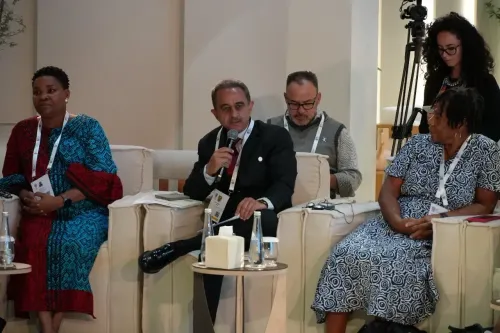Rwanda Officially Ends Marburg Virus Outbreak

Kigali, Dec 20 (NationPress) Rwanda has officially declared the conclusion of the Marburg virus disease outbreak on Friday, which was first recognized on September 27.
The proclamation was made by Minister of Health Sabin Nsanzimana during a press briefing in the capital city, Kigali. This announcement comes after a remarkable span of 42 consecutive days without any new reported cases, following the discharge of the last confirmed patient, thus aligning with World Health Organization (WHO) guidelines.
Rwanda's last confirmed case of the virus was recorded on October 30, with the final Marburg-related death occurring on October 14.
"This is a significant milestone for Rwanda's public health framework. While we grieve for the lives lost, we find solace in the progress achieved," stated Nsanzimana.
"Our success is attributed to the unwavering commitment of our healthcare professionals, the government, and our partners, whose effective collaboration and prompt action were key in managing the outbreak successfully," he added.
Nsanzimana further noted that they have successfully identified the virus's zoonotic origin and are committed to enhancing their surveillance systems.
As reported by the Ministry of Health, the outbreak, which commenced in mid-September 2024, resulted in 66 confirmed cases, including 15 deaths and 51 recoveries. Notably, among those who recovered were two patients who were extubated after receiving intensive care, a remarkable achievement in clinical management.
While celebrating the end of the epidemic, Nsanzimana stressed that preventive measures will remain in effect. Rwanda intends to utilize GPS technology for tracking bats, the primary carriers of the virus, to monitor their movements and habitats, as reported by Xinhua news agency.
"We will persist in our efforts to identify the locations of these bats," he explained. "This will enable us to keep track of their movements and habitats."
"This epidemic is unprecedented in our nation and represents a significant hurdle we have successfully overcome," the minister remarked.
Brian Chirombo, the WHO representative in Rwanda, praised the nation's efforts in managing the outbreak.
"I particularly commend the strong leadership of the government and the unified effort of Rwandans in combating this epidemic, which posed a serious threat to quality of life. Together, we triumphed, and this victory has been achieved," he stated.
"However, this is not the conclusion. The battle must continue," Chirombo cautioned.
From the very beginning of the outbreak, Rwanda promptly activated its pandemic response. A 24/7 command post was established to oversee all containment measures, including surveillance, testing, case management, vaccination, risk communication, and community engagement, according to the health ministry's statement.
The collaboration among the government, healthcare personnel, and partners employed a coordinated, evidence-based strategy to manage the outbreak effectively and swiftly, the statement further elaborated.
The successful resolution of the Marburg outbreak highlights Rwanda's commitment to strengthening its health systems and ensuring readiness for future health crises, as stated by the ministry.
The Marburg virus is a highly infectious pathogen with a fatality rate of up to 88 percent, causing hemorrhagic fever. Symptoms, including high fever and severe headaches, typically manifest within a week of exposure.
It belongs to the same family of viruses as Ebola, according to the WHO.









